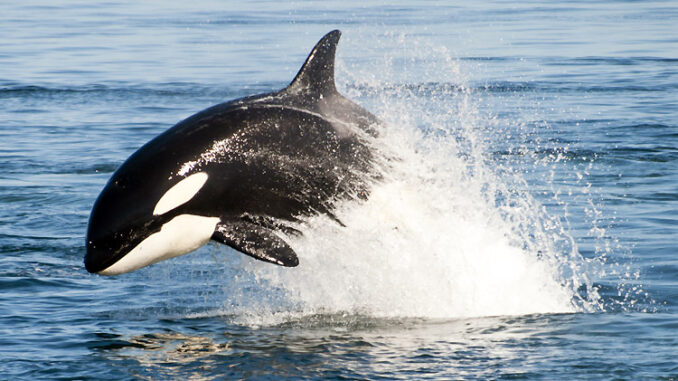
Researchers are not sure why orcas, also known as killer whales, have suddenly started ramming and sinking boats near the Iberian Peninsula.
Since the attacks started in 2020, three boats have been sunk and more than 250 damaged by a group of orcas. The animals appear to be deliberately targeting the vessels’ rudders.

BYPASS THE CENSORS
Sign up to get unfiltered news delivered straight to your inbox.
You can unsubscribe any time. By subscribing you agree to our Terms of Use
Latest Video
Experts believe there are two possible theories behind the encounters. Some believe it could be revenge while others say it is just playful behavior
According to biologist Alfredo Lopez Fernandez. One theory is that the killer whales have invented a new fad. Much as in humans, orca fads are often spearheaded by juveniles, López says. Alternatively, the attacks may be a reaction to a bad past experience involving a boat.
The behavior appears to be spreading among the population through social learning.
Live Science reports:
Three orcas (Orcinus orca), also known as killer whales, struck the yacht on the night of May 4 in the Strait of Gibraltar, off the coast of Spain, and pierced the rudder. “There were two smaller and one larger orca,” skipper Werner Schaufelberger told the German publication Yacht. “The little ones shook the rudder at the back while the big one repeatedly backed up and rammed the ship with full force from the side.”
Schaufelberger said he saw the smaller orcas imitate the larger one. “The two little orcas observed the bigger one’s technique and, with a slight run-up, they too slammed into the boat.” Spanish coast guards rescued the crew and towed the boat to Barbate, but it sank at the port entrance.
Two days earlier, a pod of six orcas assailed another sailboat navigating the strait. Greg Blackburn, who was aboard the vessel, looked on as a mother orca appeared to teach her calf how to charge into the rudder. “It was definitely some form of education, teaching going on,” Blackburn told 9news.
Reports of aggressive encounters with orcas off the Iberian coast began in May 2020 and are becoming more frequent, according to a study published June 2022 in the journal Marine Mammal Science. Assaults seem to be mainly directed at sailing boats and follow a clear pattern, with orcas approaching from the stern to strike the rudder, then losing interest once they have successfully stopped the boat.
“The reports of interactions have been continuous since 2020 in places where orcas are found, either in Galicia or in the Strait,” said co-author Alfredo López Fernandez, a biologist at the University of Aveiro in Portugal and representative of the Grupo de Trabajo Orca Atlántica, or Atlantic Orca Working Group.
Most encounters have been harmless, López Fernandez told Live Science in an email. “In more than 500 interaction events recorded since 2020 there are three sunken ships. We estimate that killer whales only touch one ship out of every hundred that sail through a location.”
The spike in aggression towards boats is a recent phenomenon, López Fernandez said. Researchers think that a traumatic event may have triggered a change in the behavior of one orca, which the rest of the population has learned to imitate.
“The orcas are doing this on purpose, of course, we don’t know the origin or the motivation, but defensive behavior based on trauma, as the origin of all this, gains more strength for us every day,” López Fernandez said.
Experts suspect that a female orca they call White Gladis suffered a “critical moment of agony” — a collision with a boat or entrapment during illegal fishing — that flipped a behavioral switch. “That traumatized orca is the one that started this behavior of physical contact with the boat,” López Fernandez said.
Orcas are social creatures that can easily learn and reproduce behaviors performed by others, according to the 2022 study. In the majority of reported cases, orcas have made a beeline for a boat’s rudder and either bitten, bent or broken it.
“We do not interpret that the orcas are teaching the young, although the behavior has spread to the young vertically, simply by imitation, and later horizontally among them, because they consider it something important in their lives,” López Fernandez said.
Orcas appear to perceive the behavior as advantageous, despite the risk they run by slamming into moving boat structures, López Fernandez added. Since the abnormal interactions began in 2020, four orcas belonging to a subpopulation living in Iberian waters have died, although their deaths cannot be directly linked to encounters with boats.
The unusual behavior could also be playful or what researchers call a “fad” — a behavior initiated by one or two individuals and temporarily picked up by others before it’s abandoned. “They are incredibly curious and playful animals and so this might be more of a play thing as opposed to an aggressive thing,” Deborah Giles, an orca researcher at the University of Washington and at the non-profit Wild Orca, told Live Science.
As the number of incidents grows, there is increased concern both for sailors and for the Iberian orca subpopulation, which is listed as critically endangered by the IUCN Red List. The last census, in 2011, recorded just 39 Iberian orcas, according to the 2022 study. “If this situation continues or intensifies, it could become a real concern for the mariners’ safety and a conservation issue for this endangered subpopulation of killer whales,” the researchers wrote.



